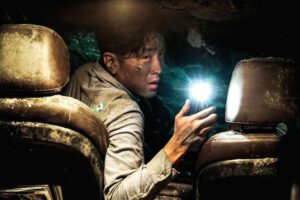Korean filmmakers are good at fusing tension and humor to create a bigger impact, while not deviating much from the basic nature of the story. Director Kim Seong-hun in his thriller feature A Hard Day (2014) relied on humor to broaden the dramatic dimensions of the story. Now, with his recent disaster cinema Tunnel (2016), he once again deftly balances the polarizing tones to create a wholly entertaining work.
Tunnel, like many other recent Korean blockbusters, cooks up pungent social commentary on the bureaucratic and media apathy. Since this is a big-budget feature, there are extended stretches of melodrama. After the initial thrills, the tension doesn’t quite live up to the kinetic charge delivered by blockbusters like Train to Busan.
Yet, it’s a well-crafted formulaic film, bolstered by terrific performances from lead actors.
Korean disaster movies are very different from Hollywood disaster cinema. The first of the difference comes forth with the looming ‘disaster’ in Tunnel materializing within the first 10 minutes.
A car salesman named Lee Jung-soo (Ha Jung-woo) leaves work to celebrate his little girl’s birthday party with a cake.
The film opens with a shot of fuel dispenser nozzle filling up petrol in a car. The frame is set inside the petrol tank, creating a tunnel-like image to indicate Lee Jung-soo’s impending predicament. He leaves with full tank of petrol, two water bottles, makes a few calls as he enters the tunnel.
The newly constructed Hado tunnel looks deserted as Lee immediately notices the widening cracks.
Soon, the tunnel caves in and buries him under a mountain of rubble. Lee’s smartphone, despite a cracked screen, works fine. And he calls up an indifferent emergency operator.
There are traces of Billy Wilder’s Ace in the Hole (1951) as the unsympathetic corporate media and grandstanding politicians try to turn the rescue operations into a carnival.
But, unlike the American masterpiece, this one focuses on the character stuck in the tunnel. And how his situation affects people around him (in Hollywood, the action would mostly centre around operation, not emotions).
Lee’s devoted wife Se-hyn (Doona Bae) finds it hard to hold herself together. The head of the rescue operation Dae-kyoung (Oh Dal-su) makes an honest conversation with Lee. He tells her it would take at least a week to rescue him. He also advises Lee on how to ration the water intake.
Lee’s wife, for her part, cooks in tent kitchen to feed hundreds of workers, digging day and night to save a human life.
Moreover, Lee, unlike Matt Damon’s Mark Watney (from The Martian), is not a man of science with a sunny disposition and well-thought out solutions. He is a simple guy who tries his best to battle against the passivity and hopelessness. Soon, things get progressively bad.
The bureaucratic muck-ups and the economic interests (‘how much money is this man’s life worth?’ becomes a important topic) come in the way of hope. Perhaps, the biggest difference between Korean and American disaster films is how the story is re-worked to comment on government and media’s handling of unnatural disaster incidents.
It’s a theme that will resonate with people facing inhumane, corrupted bureaucracy. Yet, the specificity of this theme has vital presence in South Korean films, especially in the wake of Sewol Ferry incident.
The ‘photo-session’ scene with self-serving, calm-faced ‘minister’ is an obvious commentary on former President Park Geun-hye. Such open commentaries pepper the narrative flow and add more intrigue than a de-politicized tone.
However, Tunnel becomes far-fetched and tiring in the second-half. It’s replete with too many predictable melodramatic scenes. While many scenes in the latter half seem dull, the actors do their best to hold our attention.
Doona Bae, in particular, does a fantastic job in her limited role. She is truly heart-breaking in the ‘radio show’ scene, expressing her inner conflict without hysterical emotions. Ha Jung-woo, as always (The Handmaiden, The Chaser), is charismatic in the lead role. He deftly balances his character’s hopeful and fickle nature.
Oh Dal-su (Oldboy, The Attorney, etc) is one of the best supporting actors in Korean cinema. He plays as the head of rescue site, who perfectly reflects the viewers’ frustrations.
Kim’s direction, though suffers from pacing issues, is expertly framed. He and his cinematographer Tae-sung use car’s overhead light and flashlights to eloquently capture the isolation.
Overall, Tunnel (126 minutes) is a watchable disaster thriller with slick production values and excellent performances. If not for the time-worn plot mechanics in the second-half, the film could have been top notch work in the genre.
Rating: 3/5

